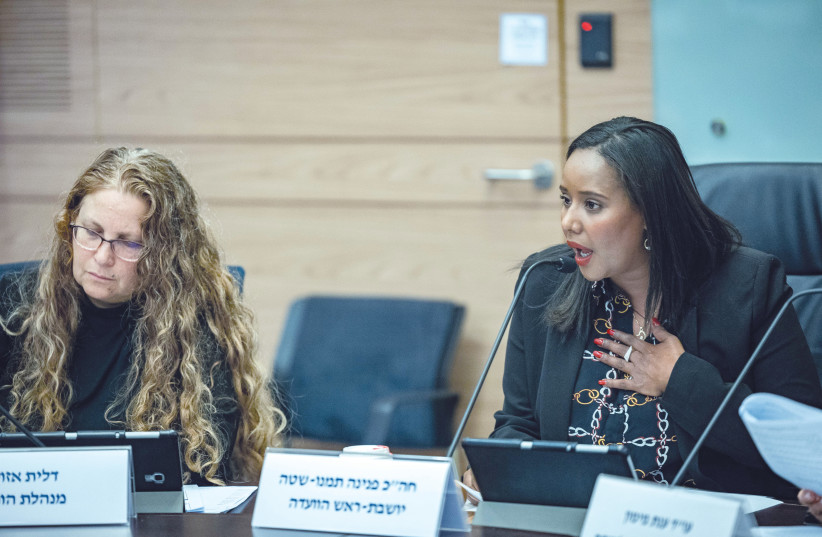A bill to end the statute of limitations for sexual offenses against minors was put forward Sunday at the Knesset's Constitution and Law Committee and Committee on the Status of Women and Gender Equality. However, it faces opposition from Justice Minister Yariv Levin.
According to the bill, certain sex crimes, such as against minors, will not have any statute of limitations. The goal of the bill is to provide "broad protection" for minors, to deter others from committing sexual offenses, and to make it easier to file a police complaint even after many years.
"Sexual offenses never expire. It's a murder of the soul and spirit," said Labor MK Efrat Rayten, who put forward the bill for its first reading in the Knesset.
Speaking at the committee, Maya and Eti Ben-Haim, two sisters who were the victims of sexual abuse during their childhood, explained to lawmakers that their father raped them day after day.
"The nightmare we lived was inside our home every day, every minute," they said. "For years, we never forgot a single day. Our parents crushed our souls instead of protecting us. For years, we stayed silent and felt guilty... After years, my sister and I decided to file a complaint to the police. Does anyone understand how much courage it takes to file a complaint against one's parents? Hours of difficult testimonies and years of instances where the very soul was wounded due to these crimes, but the statute of limitations still applies to them. The rapist will get to go on with his life under the protection of the state and law. Unfortunately, me and thousands of children, men, and women, feel like second-class citizens. There is no one who cares for us, for justice, or for truth. What is your role? Why would a victim want to file a complaint with the police? It is our duty as human beings to create change."


During the discussion, the committee members were presented with the police investigation of the sisters' complaints against their father and mother.
"This monster should be in prison for the rest of his life," committee chair MK Pnina Tamano-Shata said, describing the offender as a monster.
"We must provide a legal response to this, because if we don't, we're in trouble."
H., who was sexually abused by a family member, also shared her story with the committee.
"There was abuse within the family from the start," she said. "When I started in-depth treatment, I was abused again by a distant relative, who first started abusing me when I was seven." She explained that the relative today works as a high school teacher, teaching Tanach classes in Israel's center. H. recounted confronting him one day at the end of school hours.
"He was surprised to see me and tried to talk to me inside the school, but I wanted to talk to him on the bench outside," she said. "What amazed me is that he remembered everything that I could remember about my sexual abuse. It doesn't make sense that it would have ended with me - and he admitted to me that he abused two others. He's still working today, even though he's aware of what he's done and doesn't deny it. What am I supposed to do with this? He should stand trial, but it isn't happening."
"This discussion makes me sad," noted Yael Sherer, head of the Lobby to Combat Sexual Violence and herself a survivor of sexual abuse. "We have a problem, and we won't solve it here. Even if the bill passes, the problem still won't be solved. people will still file complaints, and the police will just end up closing them, not because of [the statute of limitations] but due to a lack of evidence. All investigations must be conducted with a large number of personnel, and there's no proposal to increase those numbers. They'll just end up closing cases like the prosecutor's office does, and that isn't going to change."
She criticized the government, accusing them of inaction regarding this longstanding issue.
"For years, they've been looking at temporary fixes, constantly patching and amending sections of the law that don't fit together," Sharer said. "There's no comprehensive action from the Justice Ministry, which needs to work on fixing this. What they are doing today is continuing to let discussions drag on without offering any thoughtful proposal [to fix it]."
Justice Ministry opposes bill, says to consider those falsely accused
Attorney Lilach Ganor presented the Justice Ministry's position on the matter.
"These testimonies are very difficult," she said. "We have made progress on the issue of statutes of limitations; the process is slow, but it is happening, though it may not be enough.
Noting that, "We are not the bad guys here," Ganor said. "It isn't right to completely cancel the statutes of limitations. There needs to be a balance. These things may be hard to hear, and I sympathize with the pain and hurt felt by the victims. But... we need to think about the cases when innocent people get accused."
Tamano-Shata described the Justice Ministry's position as offensive. "People go through a life-long process to be able to file complaints with the police. Your argument doesn't hold water," she said, adding, "Victims are being thrown to the wolves. I ask to be on the side of those seeking justice."
Responding to the committee chairwoman, Ganor said, "It is immensely difficult for a minor to file a police complaint. We met with other victims who were abused as children and heard the difficulties they pointed out to us... Therefore, we suggested extending the statute of limitations in general and not just for children abused by family members. There have been a number of discussions about this, and the justice minister asked for another meeting with the Association of Rape Crisis Centers in Israel (ARCCI). For the reasons mentioned earlier, the minister's position is that completely throwing out the statute of limitations is unacceptable."
